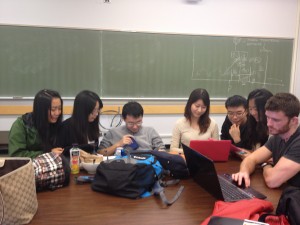Introduction:
Since 1968, the year Special Olympics was founded, there are more than 35,000 children, youth, and adults with intellectual disabilities in Canada who participate in at least two Special Olympics programs per year (Special Olympics Canada, 2013). During the summer of 2014, Vancouver will have the opportunity to celebrate athletes from across Canada participating in the Special Olympics. According to the data on the Special Olympics website (2013), there are more than 16, 000 volunteers and coaches that deliver Special Olympics programs in hundreds of communities across Canada. UBC will play a critical role in numerous aspects of the 2014 games, including housing athletes and coaches, hosting events, and supplementing all those involved with nutritious meals.
The subject of food procurement will be a great concern throughout the games, as organizers hope to promote these games with a focus on environmental sustainability. Our team, including Shaoran Li, Meng Xin, Seb Zackowski, Li Tong, Ke Liao, Yuan Shi, Wenbo Liang, and Yuanxi Wang plan on working with Heather Aussem and Matt Dolf, both involved with Special Olympics Initiatives, Loriann McGowan of UBC Food Services, and Liska Richer from the UBC SEEDS program to expand on the current food procurement system, and identify additional measures that maypromote both optimal nutrition and responsible food system management. While past LFS 350 teams have explored the potential of sustainable food procurement, in particular concerning methods of further incorporating produce from the UBC Farm into campus food distributors (LFS 350 Community Food System Project, 2012) , a project of this magnitude may be venturing into new territory for LFS students.
Research question:
Going into the project, we proposed the following all-encompassing research question: How can we remain economically viable while maximizing sustainable food procurement practices at the 2014 Special Olympics? After initial discussions with our community partners, we were directed towards a number of areas that our interventions may have the greatest effects on. This allowed us to refine our broad question into a number of tangible applications. We hope to have a high degree of influence over the menu provided by the Totem Park Cafeteria (serving the Athlete’s Village) and the “Hungry Nomad” food truck, both operated by the UBC Food Services, as well as some sway regarding both the Thunderbird Arena concession and external food vendors. Our goal is to define a baseline criteria for what comprises a sustainable menu item, and ensure that all distributors integrate at least a few of these constituents into their food options.
On top of our menu amendments, we hope to instill an educational component in all aspects of our engagement. To inform the population we are serving about the reasoning behind our efforts is as important as the physical products themselves. Our partners involved with Special Olympics Initiatives are excited about the opportunity to incorporate information booths throughout the event explaining the benefits of our efforts to promote food system sustainability. This leads us to expand on our initial research question, and propose another: Can we design standardized guidelines for future events that promote sustainable food procurement? Educating the public may be the first step towards developing these criteria, and the UBC SEEDS program may be able to apply our recommendations to future events, including Imagine Day, Faculty barbeques, and numerous other campus celebrations.
Methods:
We are currently engaged in a thorough literature review in order to gain a better understanding of our own project. Researching similar events may provide us with additional strategies in providing sustainable food options without sacrificing cost-effectiveness. In addition, understanding the quantitative aspects of athlete and spectator participation at past Special Olympics should give us insight into the necessary magnitude of food distribution throughout our event. Lastly, by exploring pre-existing food guidelines, such as those of the 2010 Vancouver Olympic Games, we may discover policies that we can re-instate, and hopefully give us a foundation of what to base our definition of “sustainable food” on. Though we hope to define our project goals by identifying and refining strategies used in successful events, literature review can only provide a glimpse into similar projects. Therefore, we may need to modify the information we find in order to meet the specific requirements of hosting the Special Olympics in the Vancouver area.
Another research method we would like to employ is based on direct observation of current food procurement practices. Opportunities include examining the current menus of our known food distributors and identifying any potential for modification. While this presents an excellent opportunity to improve the nutritional aspects of our menu plans, it may be challenging to determine the sources of observed ingredients. Thus, it is not a practical method to directly address our objectives surrounding sustainable food procurement.
Perhaps the most crucial research method involves recurrent face-to-face interviews with our community partners. The first meeting allowed us to discern areas of the event that we may influence most, and therefore prioritize our work schedule. Our group was also provided with the Totem Park Cafeteria menu over the course of the games, which we are currently examining for any potential alterations. We would like to ascertain further resources such as this during our subsequent meetings, and work together in order to define the specific criteria that all food distributors will follow. While our community partners possess a wealth of knowledge specific to our project goals, the issue of scheduling prevents many of our team members from attending meetings. It is our hope that interviews will provide a foundation that our team can pursue further opportunities to instill an appropriate event plan.

